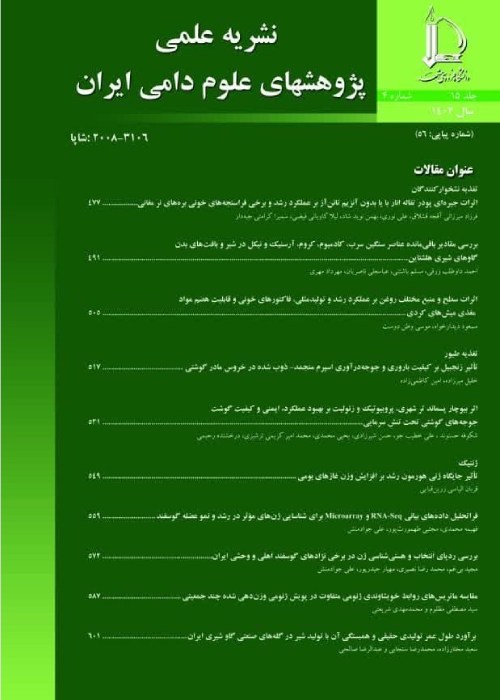The Effect of Different Dietary Levels of Yucca Schidigera Extract Powder on Performance, Blood Metabolites, Immune System and Carcass Traits of Broiler Chickens
Author(s):
Article Type:
Research/Original Article (دارای رتبه معتبر)
Abstract:
Introduction
The use of medicinal plants in poultry nutrition has been considerably increased in the recent years due to their beneficial effects, environmental compatibility and lack of adverse side effects. On the other hand, the use of antibiotic growth promoters (AGPs) in poultry production has been banned because of their residues in poultry productions and development of antibiotic resistant bacteria. The plant yucca (Yucca schidigera) belongs to agavaceae family and is native of south-western of United States and Mexico. Yucca typically grows on rocky desert slopes and creosote desert flats between 3001,200 meters altitude, rarely up to 2,500 meters. This plant thrives in full sun and in soil with excellent drainage. It also needs no summer water. The plant is known as one of the main sources of saponins. Steroidal saponins are accounted for approximately 10% of the dry weight of Yucca stem. Saponins, the main chemical component of YS extract, exist in steroidal form, whereas they are found in a triterpenoid form in other plants, such as Quillaja saponaria. Yucca saponins have antibacterial properties. The use of Yucca schidigera extract in poultry feed is a good alternative to improve feed efficiency and increased production. Yucca extract-supplemented diets have improved growth performance, relative weight of bursa of Fabricius and reduced mortality rate, breast muscle, caecal E. coli counts in broiler chickens. In the present study, the effects of different dietary levels of a commercial product containing Yucca schidigera powder on certain variables of broiler chicks were studied.Materials And Methods
This experiment was conducted using 250 Ross 308 broiler chicks in a completely randomized design with 5 treatments and five replicates of 10 chicks each. Different dietary levels of the Yucca extract powder (0, 0.01, 0.015, 0.02, and 0.025 %) were tested in a three-stage feeding program including starter (0 to 10 days of age), grower (11 to 24 d) and finisher (25 to 42 d) phases. Blood samples were collected from one bird per replicate pen to determine the selected blood metabolites including cholesterol, triglycerides, low-density lipoprotein (LDL), and high-density lipoprotein (HDL) at the end of the experiment (42 days of age). On day 42, one chick per replicate was slaughtered and carcass characteristics were assessed. The effect of dietary yucca powder levels on cellular immune response was determined by a cutaneous basophil hypersensitivity test using phytohemagglutinin-P (PHA-P). At d 42, one bird from each replicate was selected and thickness of the interdigital skin between the third and fourth digits of both feet was measured in millimeters with a Caliper (Measurement accuracy, 0.001). Immediately after the measurement, 100 µl of the PHA-P solution and phosphate buffer saline (PBS) were injected into the interdigital skin of the left and right feet by insulin syringes, respectively. Thicknesses of the skin were measured 12h and 24h post-injection. At day 28, five chicks per treatment (1 chick/replicate) were selected and 0.5 ml of 10 % sheep red blood cell (SRBC) solution was injected into their breast muscle and after seven days (day 35) blood samples were collected from brachial vein of the birds and then, an additional injection of SRBC was performed to induce the secondary anti-SRBC humoral response. At day 42, the second series of blood samples were collected. Sera separated from blood samples and were used to evaluate anti-SRBC total (Ig T), M (Ig M) and G (Ig G) immunoglobulins.Results And Discussion
The effect of dietary Yucca powder on feed conversion ratio (FCR) was significant (PConclusion
According to results of this experiment, supplementation of 0.02% Yucca extract powder, improved growth performance of the broiler chickens. However, 0.01% Yucca extracts powder improved humoral immunity and decreased blood serum LDL concentration of broiler chickens.Keywords:
Language:
Persian
Published:
Iranian Journal of Animal Science Reaserch, Volume:10 Issue: 1, 2018
Pages:
69 to 80
magiran.com/p1870253
دانلود و مطالعه متن این مقاله با یکی از روشهای زیر امکان پذیر است:
اشتراک شخصی
با عضویت و پرداخت آنلاین حق اشتراک یکساله به مبلغ 1,390,000ريال میتوانید 70 عنوان مطلب دانلود کنید!
اشتراک سازمانی
به کتابخانه دانشگاه یا محل کار خود پیشنهاد کنید تا اشتراک سازمانی این پایگاه را برای دسترسی نامحدود همه کاربران به متن مطالب تهیه نمایند!
توجه!
- حق عضویت دریافتی صرف حمایت از نشریات عضو و نگهداری، تکمیل و توسعه مگیران میشود.
- پرداخت حق اشتراک و دانلود مقالات اجازه بازنشر آن در سایر رسانههای چاپی و دیجیتال را به کاربر نمیدهد.
دسترسی سراسری کاربران دانشگاه پیام نور!
اعضای هیئت علمی و دانشجویان دانشگاه پیام نور در سراسر کشور، در صورت ثبت نام با ایمیل دانشگاهی، تا پایان فروردین ماه 1403 به مقالات سایت دسترسی خواهند داشت!
In order to view content subscription is required
Personal subscription
Subscribe magiran.com for 70 € euros via PayPal and download 70 articles during a year.
Organization subscription
Please contact us to subscribe your university or library for unlimited access!


